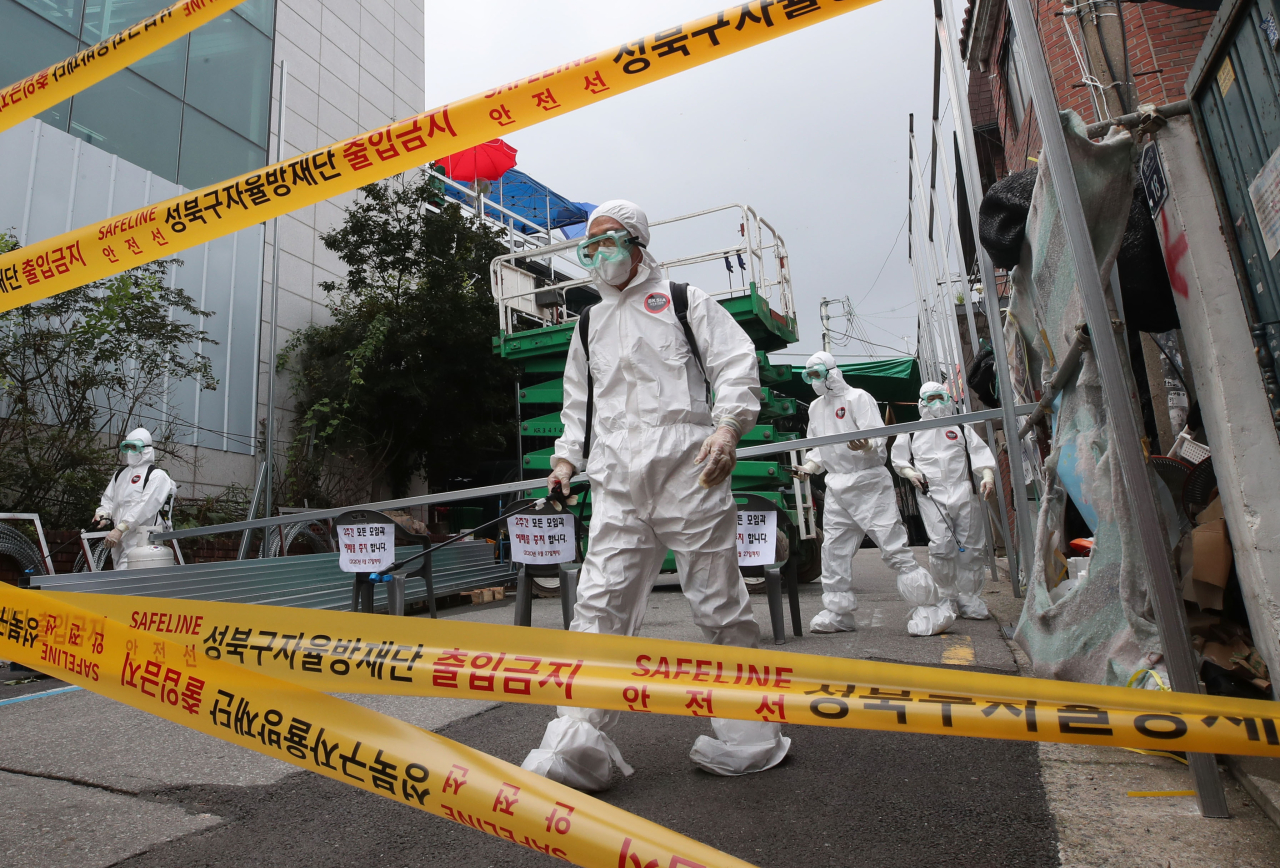S. Korea’s local infections at 4-month high, mostly linked to churches
By Ock Hyun-juPublished : Aug. 14, 2020 - 17:27

South Korea’s daily locally transmitted COVID-19 cases surged to a four-month high on Friday, mainly due to sporadic outbreaks at churches in the Greater Seoul area, leading the government to consider tightening social distancing rules to contain the coronavirus spread.
Of the country’s 108 new COVID-19 cases reported, 85 cases were locally transmitted, the most since 88 cases were registered on March 31. The total caseload has risen to 14,873, according to the Korea Centers for Disease Control and Prevention.
“The government launched a review on raising the level of social distancing (by one notch) to Level 2 in Seoul and Gyeonggi Province,” Vice Health Minister Kim Ganglip said in a briefing Frida
Under the Level 2 social distancing norms, gatherings of 50 or more people indoors and of 100 or more people outdoors are restricted. Public facilities are shut down and high-risk facilities, such as bars, should suspend their business.
The majority of the new local infections reported Friday were from the Seoul Metropolitan Region -- 31 in Seoul and 38 in Gyeonggi Province. Five cases were reported in Busan, three each in North Chungcheong Province and in Incheon.
Korea is in greater danger now as it grapples with sporadic outbreaks with unclear source of infection, the authorities said, compared to May and June when the country saw most COVID-19 cases traced to the cluster of infections at bars and clubs in Seoul’s Itaewon area.
In the past week, several clusters of infections were found simultaneously at churches, restaurants, cafes and traditional markets where unspecified individuals gather, come and go, which makes it harder for the authorities to carry out contact tracing and identify transmission routes.
The transmission routes for 13.7 percent of all cases for the past two weeks are unknown.
Churches continue to be major clusters of infections, with followers gathering in close proximity, not properly wearing masks, singing hymns and sharing meals. Since July 20, a total of 193 cases were traced to seven churches, according to the KCDC.
On Friday, some 60 members of a church in Yongin, Gyeonggi Province, which has some 1,100 members, tested positive for the virus. A 30-something man attending the church tested positive Tuesday, sickening 71 others so far. Some 400 people who attended the worship services earlier this month are being tested for the virus.
From another church in northern Seoul, 14 more members tested positive, raising the number of total related cases to 19. COVID-19 testing is underway on 1,897 people, according to the Seoul metropolitan government.
Two more cases were confirmed in connection with an office in southern Seoul, raising the number of total related cases to 18. The initial patient tested positive on Tuesday.
Seven more people were diagnosed with the virus after a patient, who tested positive on Aug. 12, visited a franchise coffee shop on Aug. 8.
At least 15 employees working at eight Lotteria fast-food chain restaurants were diagnosed with the virus as of Friday, according to the KCDC. Some 19 Lotteria employees gathered for a meeting at an outlet near Gunja Subway Station in eastern Seoul on Aug. 6 and visited two more restaurants that day.
Korea is again being put to test as the country will have a three-day holiday period around Liberation Day, which falls Saturday, as Koreans are expected to gather, move around and go outside more. Large-scale rallies are also planned in central Seoul although the city government has banned such gatherings.
Meanwhile, starting Monday, foreign coronavirus patients who violate infectious disease measures will be required to cover all costs of COVID-19 treatment and their self-quarantine. Foreigners who arrive from overseas after Aug. 24 will also be required to pay for part or all of the bills for the treatment, depending on their nationality, according to the authorities.
This came after Korea, which has treated locals and foreigners for COVID-19 free of charge, recently revised a related law as rising imported cases from overseas put a burden on the local health system.
Of Friday’s 18 imported cases, 11 were identified while the individuals were under mandatory self-quarantine in Korea, while seven were detected during the quarantine screening process at the border. Twelve of the newly diagnosed people were foreign nationals.
By country, four were from Asia -- two from Iraq, one from the Philippines and one from Kazakhstan. Nine were from the United States, one was from the United Kingdom, two from Ghana, one from Algeria and one from Ethiopia.
So far, 13,863 people, or 93.21 percent, have been released from quarantine upon making full recovery, up 46 from a day earlier. Some 705 people are receiving medical treatment under quarantine. Fourteen people remain in serious or critical condition.
The number of deaths stays unchanged at 305, with the overall fatality rate at 2.05 percent -- 2.38 percent for men and 1.77 percent for women -- as of Friday. The fatality rate is 24.96 percent for those in their 80s or over and 9.26 percent for those in their 70s.
The country has carried out 1,665,084 tests since Jan. 3, with 20,132 people awaiting results as of Friday.
By Ock Hyun-ju (laeticia.ock@heraldcorp.com)
-
Articles by Ock Hyun-ju







![[KH Explains] How should Korea adjust its trade defenses against Chinese EVs?](http://res.heraldm.com/phpwas/restmb_idxmake.php?idx=644&simg=/content/image/2024/04/15/20240415050562_0.jpg&u=20240415144419)












![[Today’s K-pop] Stray Kids to return soon: report](http://res.heraldm.com/phpwas/restmb_idxmake.php?idx=642&simg=/content/image/2024/04/16/20240416050713_0.jpg&u=)